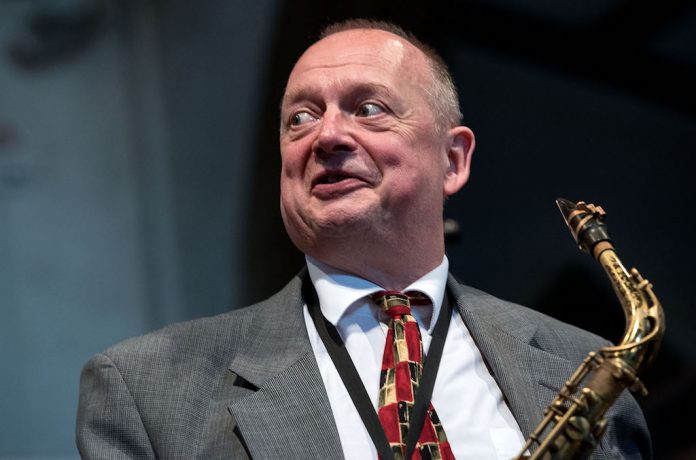
Familiar faces on the stage, familiar repertoire in the performance … yet one of the marvels of jazz is the ability of excellent musicians to personalise frequently performed themes and make them sound freshly composed.
That was certainly in evidence in one of the highlights of the fourth Ipswich Jazz Festival – the Saturday-night centrepiece show the organisers dub “Stars At St Peter’s”.
The festival is staged at a church converted into a spacious arts centre, St Peter’s-by-the-Waterfront. It’s an excellent performance space, not actually by the waterfront but quite close by (a wag once said it should be renamed St Peter’s-behind-the-Concrete-Monstrosity, as it is indeed behind a pretty grim tower block. These days the Waterfront – overlooking a marina packed with sleek yachts – is being decisively gentrified, however).
This years Stars At St Peter’s were well chosen: reeds wizard Alan Barnes, the dynamic violinist Ben Holder, lyrically expressive trumpeter Neil Yates and the splendid singer Polly Gibbons. Backing, as in previous years, came from a regional trio with international standards of musicianship: pianist Chris Ingham, bassist Arnie Somogyi and drummer George Double.
Polly’s opening song was indeed very familiar: You Don’t Know What Love Is. She sang it with absolutely convincing feeling as well as fine technical finesse, really living its poignant lyrics. Gorgeous.
Yates and Barnes duetted in very spirited style on more familiar repertoire, It Could Happen To You (“And it could,” Yates told the sold-out audience, “So be careful.”). Holder’s outstanding feature was a captivating duet with pianist Ingham: Nuages.
The evening had opened with a snappy performance by the West Suffolk Youth Jazz Ensemble, including a nimble version of the Sonny Rollins calypso St Thomas. The excellent quality of youth bands should not surprise us, but listeners are often amazed by the sophistication of promising school-age players.
The festival had opened in very vibrant style on the Friday with a furiously energetic show by the New Orleans-rooted eight-piece band The Brass Funkeys, who had many in the packed crowd dancing. The line-up of two trumpets, two trombones, tenor saxophone, sousaphone, drums and percussion kicked off at full-blast, and kept up the intensity for most of the two-hour show. Great fun, though I yearned for more contrast and dynamic range.
On the concluding Sunday, the band Samba Azul held a Brazilian jazz workshop for percussion students and other instrumentalists, before giving a two-hour show for the public, with free admission. Other workshops featured singer Becki Biggins with jazz for the very young, trumpeter Ian Buzer on free improvising, Polly Gibbons on singing, saxophone technique by Alan Barnes, a music photography workshop led by me, rhythm playing by Mark Sewell, and ensemble playing by John Seeley.
The festival concluded with an excursion into more adventurous and exotic sounds with the trio Mammal Hands – saxophonist Jordan Smart, pianist Nick Smart and percussionist Jesse Barrett. Based in Norwich, the trio is making a significant impact on the international scene with a blend of electronics, world music and vibrant jazz, and already have three acclaimed albums to their credit. The style is quite original, bringing to mind at times the melodic grace of the Jan Garbarek Group, the pulsing rhythms of the Swiss band Ronin, and elements of North Indian folk and classical music. Their 90-minute performance was full of interest, with excellent use of dynamics and tonal colours, their original compositions including Refuge, Black Sails, Kudu, Living Frost and Boreal Forest.
A tremendously satisfying conclusion to a festival that draws more interest and bigger crowds every year.















